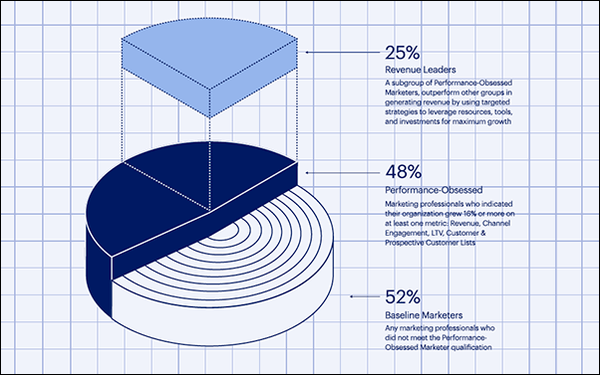
Email remains a strategic backbone for most marketers as
search declines, judging by The Revenue Blueprint, a study by Intuit Mailchimp.
Of the companies polled, 69% state that email is the foundation of their marketing strategy. And 59% say email
is necessary for customer engagement as search is less utilized.
But the way email is used depends on the level of marketing sophistication.
The report divides marketers
into three categories:
Baseline marketers: marketers that achieve steady, consistent results using standard marketing practices — 52%
Performance-obsessed marketers: top-tier
marketers that experience substantial growth across key metrics by leveraging innovative tactics. For example, compared to baseline marketers, they “rely more heavily on targeted emails and
automated journeys. They also have higher adoption levels for transactional emails that respond to customer journey triggers” — 48%
advertisement
advertisement
Revenue leaders: a subgroup of top-tier
marketers that drive significant growth within high-revenue organization by utilizing optimal resources, tools, and investments — 25%
When it comes to generating awareness,
performance-obsessed marketers make email marketing their primary focus and use other channels to grow their list of prospective customers, driving audiences to landing pages featuring email sign-ups
and promotions to create a connected funnel.
In addition, 56% say SMS is influential in driving awareness and purchases.
Baseline marketers are more likely to use channels
such as social media, their website, and digital ads than performance-obsessed marketers. They “also have lower adoption rates of email marketing, which points to a different go-to-market
channel mix.”
The takeaway? “Since baseline marketers underperform compared to performance-obsessed marketers, this could indicate these channels have less of a return compared to
email.”
The study also found that 89% of revenue leaders automate nearly the entire customer journey.
Moreover, 57% of performance-obsessed marketers and 64% of revenue
leaders use data platforms for hyper-personalized interactions and predictive analytics, compared to only 39% of baseline marketers.
And while 74% of total respondents report using AI,
revenue leaders do so more effectively than other marketers by using AI as a strategic assistant, combining generative and analytical AI. Revenue leaders say AI has driven higher order values and
increased customer lifetime value, while the other two groups see mostly efficiency and brand-awareness gains.
Intuit Mailchimp surveyed 2,005 marketers from April 5 to May 20, 2024,
across North America, Europe and Oceania.